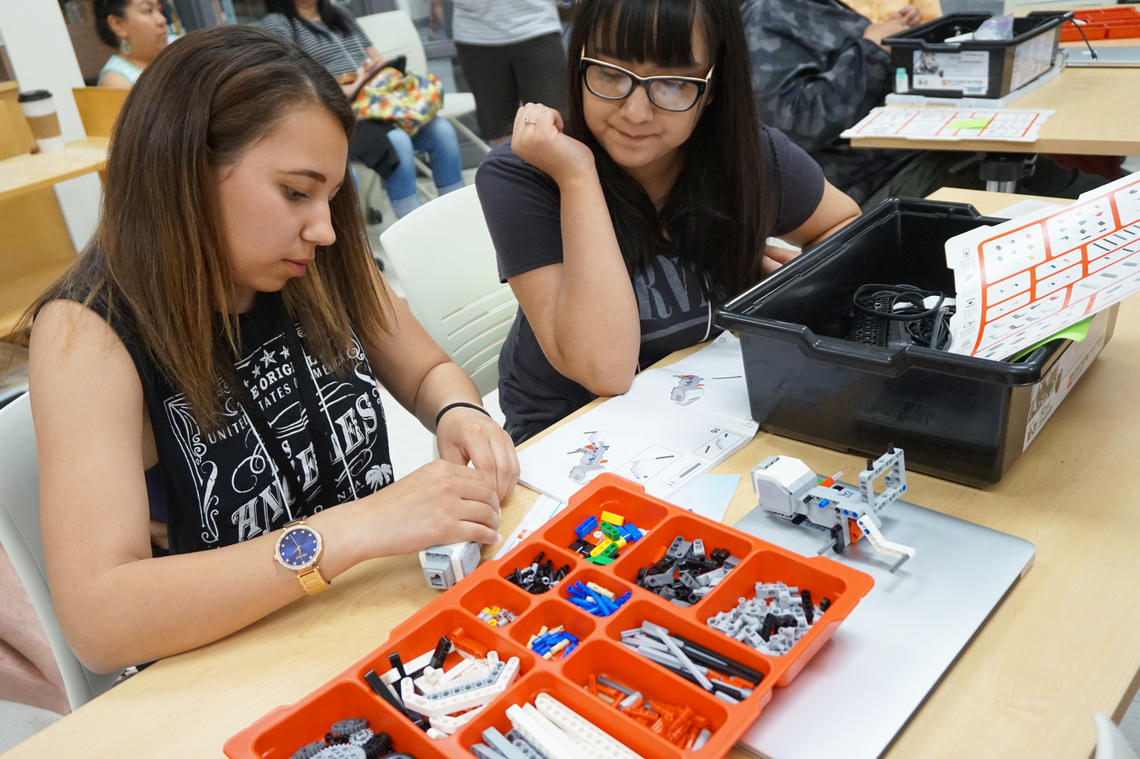June 21, 2018
First lndigenous Youth Forum creates sense of belonging for rural youth

Hands-on experiences allowed rural students to view themselves as future university students.
Clayton MacGillivray, Werklund School of Education
Two Grade 9 students silently watch the crane remove and lower exterior precast concrete panels from the MacKimmie Library tower. Coming from the Village of Hythe, Alta., this is their first university experience — they say they are surprised at the expanse of the campus, the number of buildings and, although the spring semester is a relatively quiet time, the number of students.
Understanding that an urban campus in a large city might be intimidating for students from rural parts of the province was one of many factors considered in the design of the Werklund School of Education’s Indigenous Youth Forum. As part of the Werklund School’s larger initiative, Increasing First Nations, Métis and Inuit Education in Initial Teacher Education, one of the objectives of the two-day forum was to provide students with a taste of what it would be like to study at the University of Calgary.
A welcoming environment
These young men were two of 18 Indigenous youths invited to campus because they were identified by their teachers as having leadership potential, academic aptitude and an interest in pursuing post-secondary education. The remaining 16 students came from the communities of Brocket, Stand Off and Wabasca-Desmarais.
“We had several goals in mind when designing the inaugural forum, one of which was to support the university’s Indigenous Strategy and its aim of creating a respectful and welcoming learning environment for all learners,” explains Anthony Hampshire, project relationship specialist. “We hope that the core take-away for students is that attending UCalgary is a viable aspiration, and that, while it is a very different place, it is a community where they belong.”
Hampshire adds that the students quickly immersed themselves in the university experience. Activities were purposely designed to involve them in active, hands-on learning experiences, and discussions were facilitated to surface leadership, collaboration, new ideas and promote a sense of agency.
“We wanted to give students opportunities to participate authentically in a university setting in a typical way asked of education students,” explains Shirley Pepper, Werklund School instructor.
Agents of change
Each morning began with a blessing by Blackfoot Elder Kelly Good Eagle, after which students took part in design-thinking and STEM workshops and group discussions facilitated by Werklund School students and alumni. As well, attendees explored the campus and enjoyed a trip to Prince’s Island Park and the Peace Bridge.
The students said a highlight of the forum was their visit to the Native Centre, where Cheryle Chagnon-Greyeyes warmly welcomed them and explained the significant support available to UCalgary Indigenous students.
The organizing committee, aware that Indigenous students face obstacles when it comes to completing high school and enrolling in a post-secondary institution, worked to build their confidence so they felt empowered to discuss ideas, strategies and solutions for real-world problems. Community challenges the students identified include poverty, low rates of school attendance, and substance abuse.
“It was obvious that they are dealing with complex issues. I could see that students and staff were genuinely thinking of how they could make positive changes,” says Pepper.
Bachelor of Education student Elizabeth Howard and Werklund School alum Jadyn Fischer-McNab facilitated the group discussions. Howard says the students she worked with focused on community, barriers to success and paths forward. “Some of the students expressed interest in mentorship for those who want to complete high school or attend post-secondary, as well as having Indigenous role models visit the schools.”
Fischer-McNab found success in letting the students lead the conversation: “It was definitely challenging to get the students to open up; it took a while but eventually some became more comfortable.”
She adds that she profited from the interaction. “I benefited from this experience as it gave me an opportunity to gain some experience in communicating with Indigenous youth and share how I felt as a young Indigenous student.”
Future teachers
Hampshire believes an assured way these students can make a positive impact on their community is by embarking on careers as teachers.
“Alberta teachers have a rich tradition of contributing to the social, cultural and political fabric of the communities they serve. They are often valued as leaders who can help to address some of the challenges these students noted in their discussions,” he says. “In particular, Indigenous teachers have a first-hand understanding of remote or reserve communities as well as First Nations history, world view, colonization, residential school impacts, and efforts toward reconciliation. This forum was a first step toward eventual recruitment of more Indigenous teachers in these communities.”
Staff and student reaction at the conclusion of the forum was overwhelmingly positive.
“Students came back talking about going to the university in four years! This is a first. They were able to see themselves going there, thanks to your conference,” says Nancy Spencer Poitras, Northland School Division associate superintendent.
Plans are underway for next year’s forum and the students who return for the second year will act as mentors for first-time participants. In this role, they will have the opportunity to explain to their peers that, regardless of the number of students and buildings on campus, UCalgary is a community where they belong.
The University of Calgary unveiled its Indigenous Strategy, ii' taa' poh' to' p, on Nov. 16. The strategy is the result of nearly two years of community dialogue and campus engagement, and involved the work of a number of people from the university, Indigenous communities and community stakeholders. Recommendations from the strategy will be implemented in the coming weeks, months and years as we move forward with promise, hope and caring for the future.

